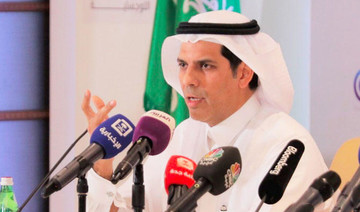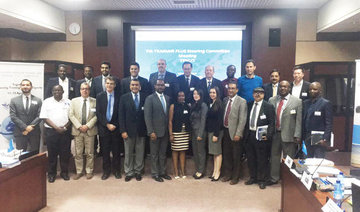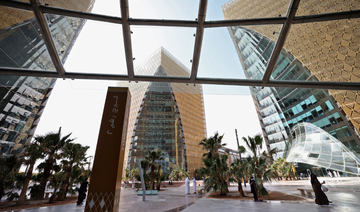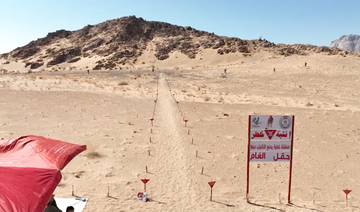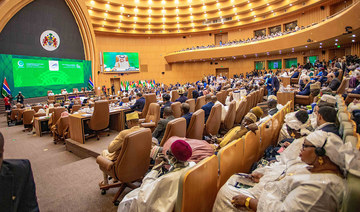RIYADH: The General Authority of Civil Aviation (GACA) hosted the opening of the 2019 Global Aviation Summit (GAS), a two-day international forum, at the Ritz-Carlton hotel in Riyadh on Monday.
In his opening address, Saudi Minister of Transport Dr. Nabeel Al-Amoudi discussed the value of the industry to the Kingdom, stating that civil aviation generated an estimated $126 billion annually, as well as providing 527,000 jobs.
He also discussed the recent accidents involving two Boeing 737 MAX aircraft, saying there were no immediate plans to allow the model to operate in Saudi airspace. “There were no 737 MAX aircraft flying in the Kingdom at the time,” he said, “and there aren’t plans for them to fly again in the near future.” Boeing’s top-selling MAX jet was grounded globally last month after two fatal crashes in Indonesia and Ethiopia.
Boeing’s senior managing director for commercial marketing, Darren Hulst, gave a keynote address where he discussed the Kingdom’s peculiarly opportune position in the global aviation industry.
“Saudi Arabia is unique, both as a strategic location and a destination, through pilgrimage and the Hajj and Umrah sector, and growing tourism opportunities,” he said.
“There is also the whole economic industry that comes along with aviation. Boeing has been a part of building that industry he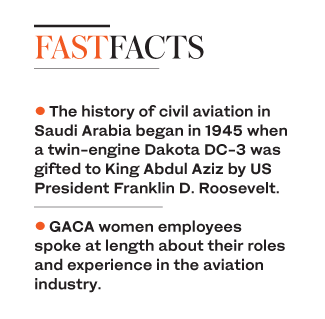 re in the last few decades, with various partnerships and joint ventures, and we are continuing to accelerate those investments.”
re in the last few decades, with various partnerships and joint ventures, and we are continuing to accelerate those investments.”
The history of civil aviation in Saudi Arabia effectively began in 1945, when a twin-engine Dakota DC-3 was gifted to King Abdul Aziz by US President Franklin D. Roosevelt. It was the first aircraft to land in the Kingdom, and it marked the beginning of Boeing’s relationship with the country.
“When we think about where we are today and where we can be as an industry in the next decade, the opportunities are limitless,” Hulst continued. “When you take into consideration the number of airplanes to support, the number of people to train, and the value of goods and services produced, we think this country has a unique advantage. In general, aviation growth has always doubled in relation to economic growth. Here in Saudi Arabia, though, because of all of its advantages, we see a fourfold multiplier effect. Boeing looks forward to being a part of it.”
The GACA’s media spokesman, Ibrahim Al-Rosa, said: “We are hosting over 150 high-profile individuals, including the heads of the world’s largest aviation companies. The GACA has long believed in the importance of this industry, its development and progress, which includes investment opportunities and the ushering in of a promising young generation of men and women.”
Female GACA employees also spoke at length about their roles and experience in the aviation industry. At the “Women in Aviation” panel discussion, Haifa Hamedaldean, transformation project manager for the Saudi Air Navigation Services (SANS), discussed the roles women now hold in aviation.
“I’m delighted to represent SANS as a vehicle for female empowerment in the aviation industry,” Hamedaldean said. “SANS not only attracts women in administrative roles, but also in operational ones. In little over a year, SANS has grown the number of women employed from zero to 38. You’ll find them in strategy, management, engineering and information technology. You’ll see them in human resources, in training and recruitment. Eleven of our women serve as air-traffic controllers and we are expecting 15 more to join us by the end of this year.”
As Saudi Arabia continues to diversify its economy, the civil aviation industry represents a key pillar in that change, given the country’s location as a global logistical hub. Investment deals proposed at the GAS could see thousands of jobs created, and would raise the Kingdom’s global ranking in the Logistics Performance Index from 49 to 25. Direct foreign investment, currently at 3.8 percent, would rise to 5.7 percent of the gross domestic product. At the GAS, a memorandum of understanding was signed between the Kingdom and Argentina on air transport cooperation, while agreements were also signed with Georgia and Chad, in addition to an air service agreement between the GACA and the Cypriot government.
2019 Global Aviation Summit opens in Riyadh
2019 Global Aviation Summit opens in Riyadh
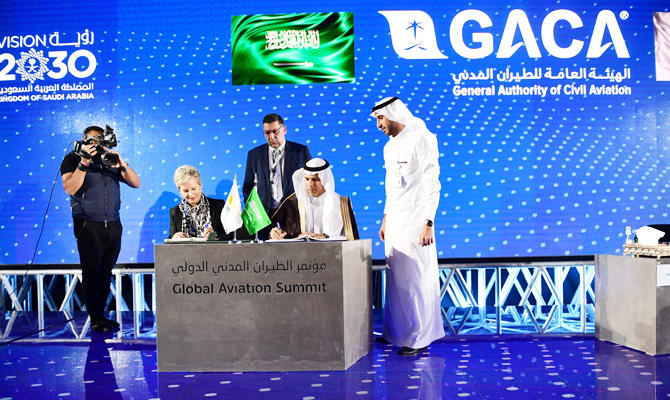
- Civil aviation sector in the Kingdom generates an estimated $126 billion in revenues annually
- Investment deals proposed at the GAS could see thousands of jobs created, and would raise the Kingdom’s global ranking in the Logistics Performance Index from 49 to 25
French classical concert tour for children in Saudi Arabia comes to an end

- Audience was mostly made up of parents with young children
- Concert was organized by Alliances Francaises in partnership with the French Embassy in Saudi Arabia and other French organizations
ALKHOBAR: Fresh from performances in Riyadh and Jeddah, the Concert Impromptu, a classical ensemble made up of French musicians that was established in 1991, journeyed into Alkhobar on Saturday for the final stop on a tour presenting a program designed specially for children.
There was a palpable energy at the concert, which was held at the newly opened Saudi Music Hub space, a colorful cluster of buildings near the corniche.
Yves Charpentier played the flute; Violaine Dufes the oboe; Jean Christophe Murer the clarinet; Emilien Drouin the French horn; and Vincent Legoupil the bassoon.
They started with Mozart, who had famously started off composing as a child, and then went on to other classical compositions that they joked were possibly something the audience had heard previously only as somebody’s ringtone.
The audience was mostly made up of parents with young children.
One such attendee was Abul Fahimuddin, who recently moved to Dhahran with his wife, Joana Macutkevic, and their two young daughters. As soon as he heard about the concert, he immediately signed them all up.
“Me and my family have just arrived from Norway several months (ago) … we came to know there is a music concert. We're very keen on what’s happening in the Alkhobar area because we’re living here in Aramco Camp,” Fahimuddin told Arab News.
His two daughters, dressed in pretty blue and white dresses, were plainly delighted to be there.
“I’m excited to see what instruments will be played and how the theater will look. I used to play piano but because of (the pandemic), I had to stop my piano lessons,” Kaja, 11, told Arab News before the show.
Stella, 8, who likes to sing, was giddy. “I’m also excited — like Kaja,” Stella said. “Now in my school, we started to play the xylophone.”
The Fahimuddin family came to the concert to enjoy the experience, but also with the aim to connect with other families that have recently arrived in the Kingdom and to be part of the budding creative community in the area.
“Music is a universal language; we don’t need to speak the same language to enjoy and feel the same atmosphere and the vibe,” Macutkevic told Arab News. “And, for the girls, hopefully the concert will make them more curious about the instruments and about the music,” she added.
Each musician took the time to playfully interact with the audience, and took the time to ask and answer questions and to explain what each instrument was and how to play it.
While the musicians played as an ensemble, they also had solo parts and, at the end, Dufes took the lead, instructing the audience to snap their fingers, clap and make specific sounds while her fellow musicians played along.
“Now you are all musicians,” she told the crowd at the end, to roars of laughter.
The event was organized by Alliances Francaises in partnership with the French Embassy in Saudi Arabia and other French organizations.
Saudi Arabia sees 30% drop in work injuries
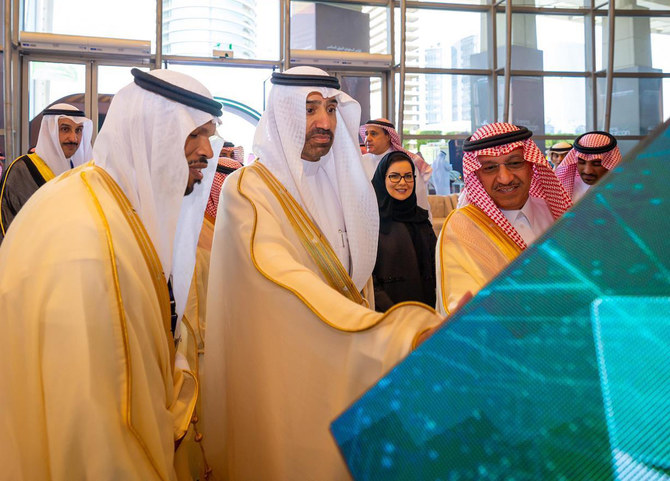
- Saudi minister launches platform for reporting and investigating workplace incidents
RIYADH: Saudi Arabia’s commitment to occupational safety and health has seen the rate of work-related injuries in the Kingdom drop from 416 to 288 injuries per 100,000 workers, over the past few years, marking a notable 30.7 percent decrease.
At the same time, the compliance rate among establishments with occupational safety and health standards has risen to 71.27 percent.
This progress was highlighted by Saudi Minister of Human Resources and Social Development Ahmed Al-Rajhi as he inaugurated the sixth Saudi Global Conference for Occupational Safety and Health in Riyadh on Sunday, signaling a promising future for worker safety in the country.
The forum, which runs until May 7 under the theme “Scanning the Horizon,” covers five main topics: sustainability, corporate safety, technological transformation, cultural awareness, and occupational health.
Al-Rajhi, who is also the chairman of the National Council for Occupational Safety and Health, highlighted the remarkable progress Saudi Arabia has made in the OSH sector in recent years.
He attributed this success to the collaborative programs and initiatives launched in conjunction with Saudi Vision 2030, aimed at creating a vibrant society and building a diverse and sustainable economy.
Al-Rajhi noted that through the national policy on occupational safety and health, the Kingdom aims to strengthen and develop the OSH sector, promote and protect workers across various workplaces at the national level, in line with local regulations and international treaties and agreements, and implement the best global practices suitable for the labor market.
The minister launched the official website of the National Council for Occupational Safety and Health, and mentioned the e-training platform for OSH, as well as the platform for reporting and investigating work-related accidents, injuries, and occupational diseases.
Al-Rajhi praised the council for its dedicated efforts and the collaborative contributions of various sectors within the council and the broader OSH system.
The achievements in the OSH sector were bolstered by the enactment of several pieces of legislation aimed at raising awareness of occupational safety and health issues, notably through the strategic implementation of the national occupational safety and health program, the Saudi Press Agency reported.
Key legislative measures include the issuance of administrative regulations related to OSH and the development of a comprehensive national policy in collaboration with the International Labor Organization and all stakeholders. This policy, endorsed by the Council of Ministers, ensures its integrity and reliability, with careful monitoring and follow-up on implementation, according to the SPA.
Al-Rajhi inaugurated the exhibition accompanying the conference and toured various partner pavilions, sponsors, and participating entities. Among these were the pavilions of the General Organization for Social Insurance and Saudi Aramco.
Riyadh expo to showcase poultry innovations

- Exhibition is the largest in the poultry industry and will feature over 300 companies from 40 countries
- More than 800 products from the poultry industry’s supply chain will be exhibited
RIYADH: “Value Engineering” is the theme of the third Middle East Poultry Expo, to be held at Riyadh International Convention and Exhibition Center from May 13-15.
Sponsored by the Ministry of Environment, Water and Agriculture, the exhibition is the largest in the poultry industry and will feature over 300 companies from 40 countries, the Saudi Press Agency reported.
The event will bring together international companies and experts in the poultry industry and showcase the latest technologies and innovations in poultry breeding, production, animal health and the feed industry.
It aims to promote the use of modern technologies, foster the exchange of experiences and best practices, develop the poultry industry, enhance investment opportunities, and contribute to gross domestic product growth to achieve national food security objectives, according to SPA.
More than 800 products from the poultry industry’s supply chain will be exhibited with the goal of promoting trade, encouraging scientific exchange and building business networks in the largest poultry markets in the Middle East and North Africa.
Those taking part include government bodies and institutions, associations, companies and nonprofit organizations in the livestock sector.
The three-day exhibition will also feature the Poultry Knowledge Planet Seminar, featuring experts from major international companies, and a number of scientific lectures.
Saudi project clears 719 Houthi mines in Yemen
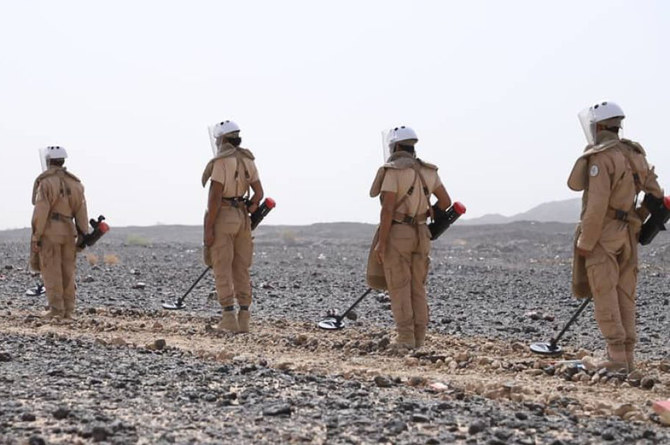
RIYADH: Saudi Arabia’s Project Masam cleared 719 mines in Yemen — which had been planted by the Houthi militia — between April 27 to May 3, according to a recent report.
Overseen by the Kingdom’s aid agency KSrelief, the project’s special teams destroyed 631 pieces of unexploded ordnance, 83 anti-tank mines, three improvised explosive devices, and two anti-personnel mines.
The explosives, which were planted indiscriminately by the Houthis across Yemen, posed a threat to civilians, including children, women and the elderly.
Project Masam is one of several initiatives undertaken by Saudi Arabia at the request of King Salman, which has cleared routes for humanitarian aid to reach the country’s citizens.
The demining operations took place in Marib, Aden, Jouf, Shabwa, Taiz, Hodeidah, Lahij, Sanaa, Al-Bayda, Al-Dhale and Saada.
A total of 439,132 mines have been cleared since the start of the initiative in 2018, according to Ousama Al-Gosaibi, the project’s managing director.
The initiative trains local demining engineers and provides them with modern equipment. It also offers support to Yemenis injured by the devices.
About 5 million people have been forced to flee their homes since the beginning of the conflict in Yemen, many of them displaced by the presence of land mines.
Masam teams are tasked with clearing villages, roads and schools to facilitate the safe movement of civilians and the delivery of humanitarian aid.
GCC chief stresses Islamic unity at OIC summit

RIYADH: Jasem Albudaiwi, secretary-general of the Gulf Cooperation Council, said that member countries value their Islamic roots and aim to strengthen ties with other Islamic nations at all levels.
“The GCC countries have always extended their hands for cooperation and to establish fruitful partnerships with all Islamic countries, believing in the importance of this deep connection derived from our culture, religion and prophetic tradition.”
He made the comments Saturday during the 15th session of the Islamic Summit Conference in Banjul, the capital of Gambia.
Delegations from the 57 OIC member states attended the conference, organized by the Organization of Islamic Cooperation under the theme “Enhancing unity and solidarity through dialogue for sustainable development.”.
In his speech, Albudaiwi, said: “Today, we gather while the world is facing numerous and escalating challenges. In light of these dangerous developments, the role of the GCC and the OIC as two active forces to confront the multiple crises in our region and the world as a whole becomes prominent.
“The common challenges we face require collective action and solidarity to promote the values of peace and prosperity, particularly considering what Palestine and the Gaza Strip are subjected to — a brutal attack by Israeli occupation forces.”
Albudaiwi also highlighted the key outcomes of the extraordinary Arab-Islamic joint summit held in Riyadh last year. This meeting led to the creation of a ministerial committee to travel the world, seeking to aid and protect the Palestinian people in Gaza by reducing violence, safeguarding civilians, and reviving peace initiatives.
He praised the role played by this committee in stopping the aggression in the Gaza Strip, a role that is aligned with those of the GCC and other Arab and Islamic organisations.
The GCC chief noted that after more than 211 days, the Palestinian people in Gaza continue to suffer from the ongoing violence perpetrated by the occupying forces, with 35,000 people — mostly children and women — having died at an average rate of 165 deaths per day.
He also pointed out the significant threats to security and stability, especially because the escalating crises in the Middle East are linked to the turmoil in Palestine and Gaza.
“The ongoing Israeli aggression requires us all to renew our commitment to collective and responsible action in supporting the Palestinian people and their legitimate rights,” he said.
Albudaiwi also emphasized the need to prioritize sustainable development in the agendas of the GCC and the OIC. “It requires all of us to work together to address the environmental and economic challenges that affect our countries and peoples. Additionally, we must enhance cooperation in the fields of science, technology, and innovation to support sustainable development projects.”



